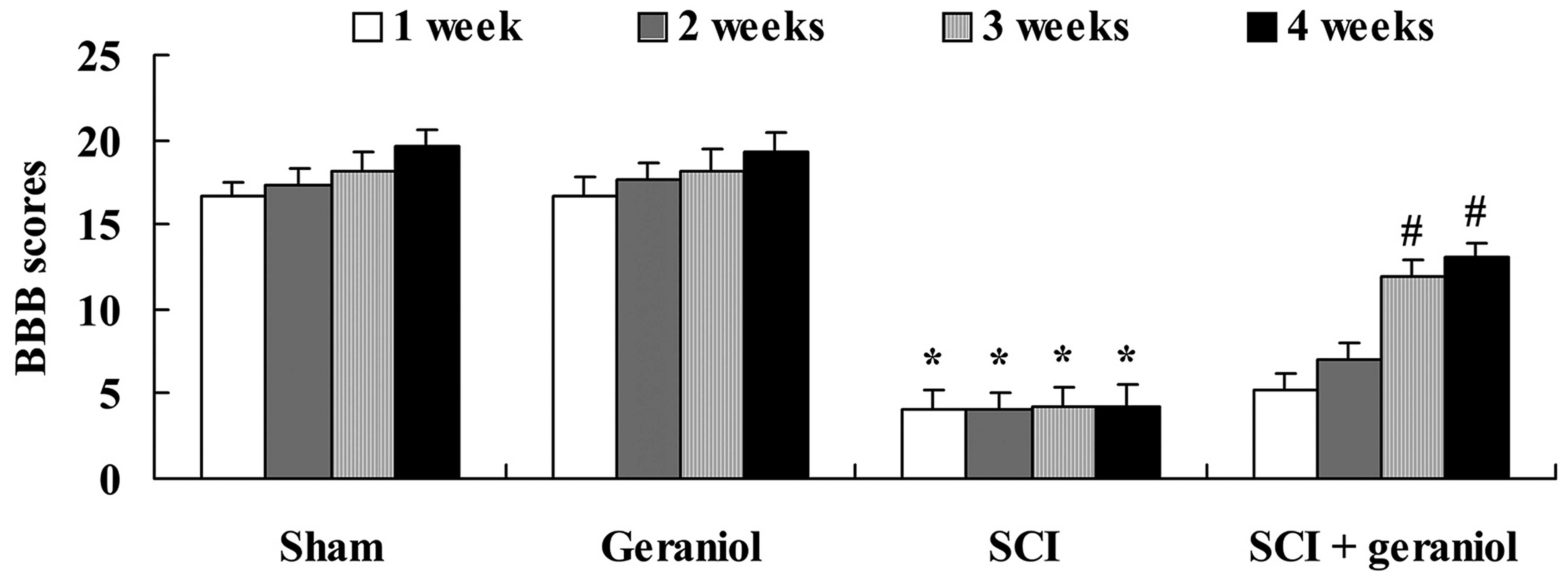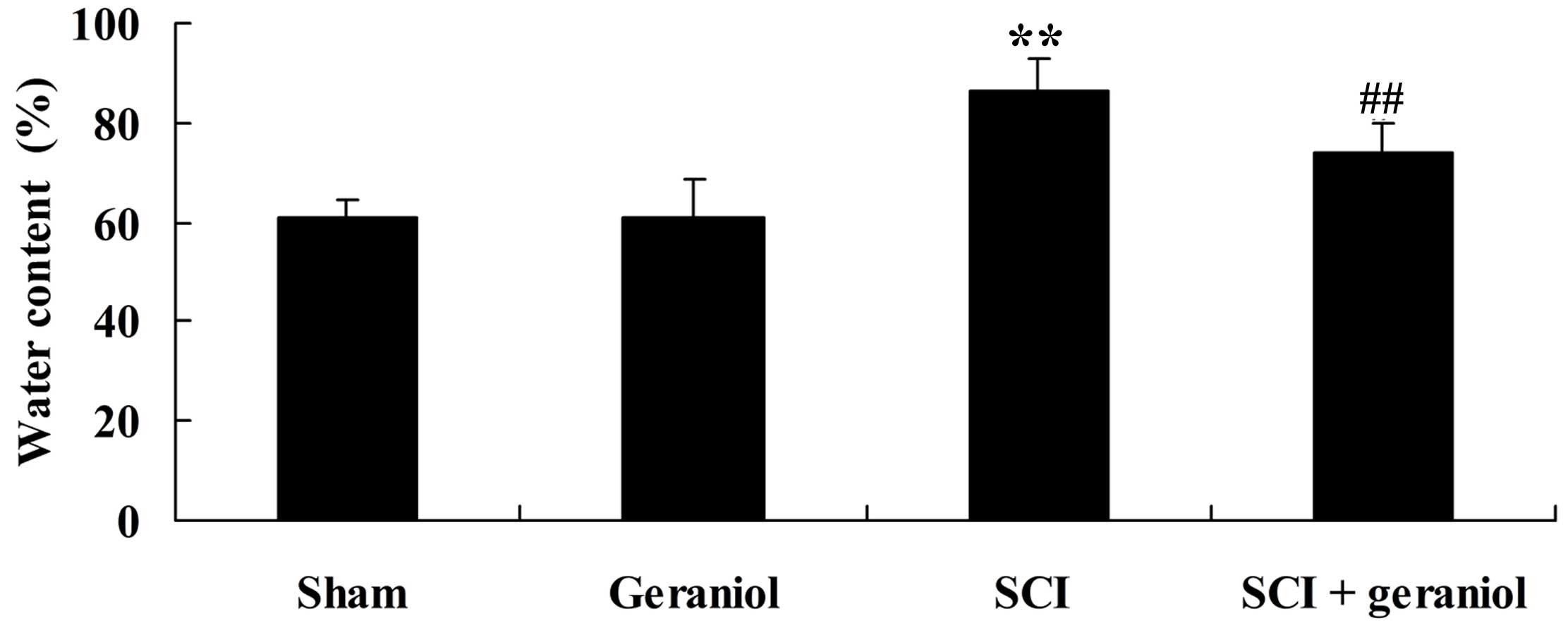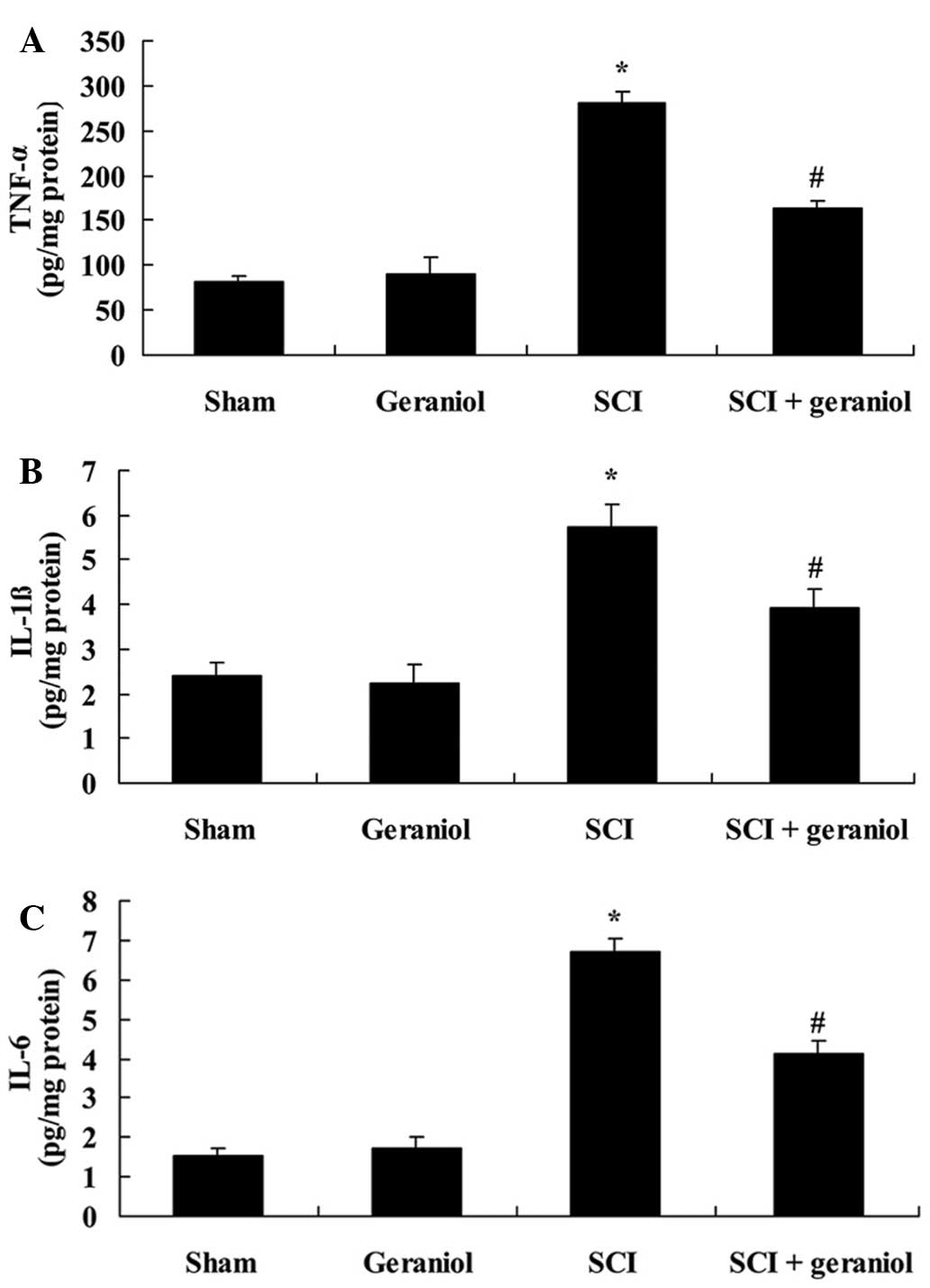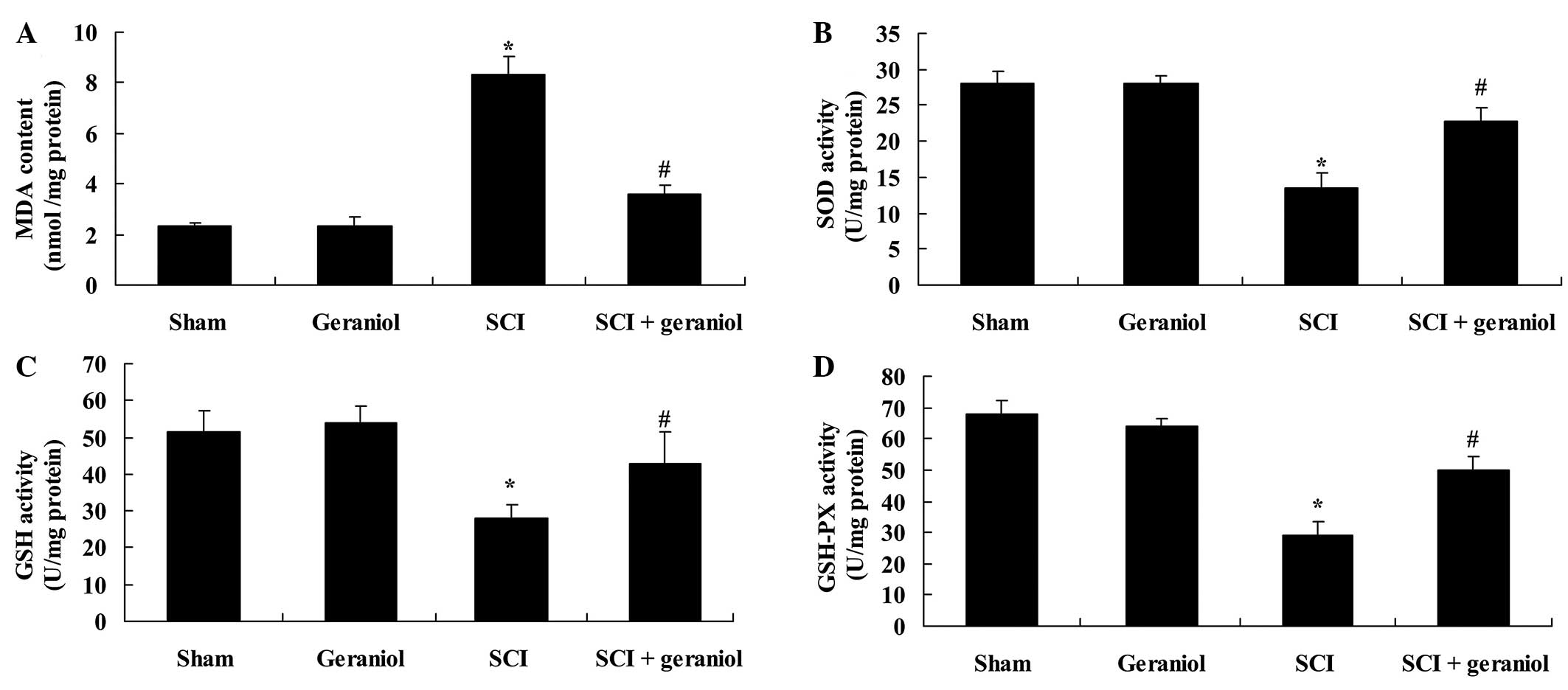|
1
|
Kuo CY, Liou TH, Chang KH, Chi WC,
Escorpizo R, Yen CF, Liao HF, Chiou HY, Chiu WT and Tsai JT:
Functioning and disability analysis of patients with traumatic
brain injury and spinal cord injury by using the world health
organization disability assessment schedule 2.0. Int J Environ Res
Public Health. 12:4116–4127. 2015. View Article : Google Scholar : PubMed/NCBI
|
|
2
|
Lin B, Xu Y, Zhang B, He Y, Yan Y and He
MC: MEK inhibition reduces glial scar formation and promotes the
recovery of sensorimotor function in rats following spinal cord
injury. Exp Ther Med. 7:66–72. 2014.PubMed/NCBI
|
|
3
|
Turbes CC: Repair, reconstruction,
regeneration and rehabilitation strategies to spinal cord injury.
Biomed Sci Instrum. 34:351–356. 1997.PubMed/NCBI
|
|
4
|
Reichenfelser W, Hackl H, Hufgard J,
Kastner J, Gstaltner K and Gföhler M: Monitoring of spasticity and
functional ability in individuals with incomplete spinal cord
injury with a functional electrical stimulation cycling system. J
Rehabil Med. 44:444–449. 2012. View Article : Google Scholar : PubMed/NCBI
|
|
5
|
Emon ST, Irban AG, Bozkurt SU, Akakin D,
Konya D and Ozgen S: Effects of parenteral nutritional support with
fish-oil emulsion on spinal cord recovery in rats with traumatic
spinal cord injury. Turk Neurosurg. 21:197–202. 2011.PubMed/NCBI
|
|
6
|
Vuckovic A, Hasan MA, Fraser M, Conway BA,
Nasseroleslami B and Allan DB: Dynamic oscillatory signatures of
central neuropathic pain in spinal cord injury. J Pain. 15:645–655.
2014. View Article : Google Scholar : PubMed/NCBI
|
|
7
|
Tederko P, Krasuski M, Ptyushkin P, Selb
M, Pawlak K, Skrzypczyk R and Escorpizo R: Need for a comprehensive
epidemiologic study of spinal cord injury in Poland: Findings from
a systematic review. Spinal Cord. 51:802–808. 2013. View Article : Google Scholar : PubMed/NCBI
|
|
8
|
Price S: Specific anosmia to geraniol in
mice. Neurosci Lett. 4:49–50. 1977. View Article : Google Scholar : PubMed/NCBI
|
|
9
|
Lapczynski A, Bhatia SP, Foxenberg RJ,
Letizia CS and Api AM: Fragrance material review on geraniol. Food
Chem Toxicol. 46:(Suppl 11). S160–S170. 2008. View Article : Google Scholar : PubMed/NCBI
|
|
10
|
Merlini V, Luparia M, Porta A, Zanoni G
and Vidari G: Biomimetic cyclization of geraniol derivatives, a
useful tool in the total synthesis of bioactive monocyclic
terpenoids. Nat Prod Commun. 6:465–476. 2011.PubMed/NCBI
|
|
11
|
Leite MC, de Brito Bezerra AP, de Sousa JP
and de Oliveira Lima E: Investigating the antifungal activity and
mechanism(s) of geraniol against Candida albicans strains. Med
Mycol. 53:275–284. 2015. View Article : Google Scholar : PubMed/NCBI
|
|
12
|
Hsu JY, McKeon R, Goussev S, Werb Z, Lee
JU, Trivedi A and Noble-Haeusslein LJ: Matrix metalloproteinase-2
facilitates wound healing events that promote functional recovery
after spinal cord injury. J Neurosci. 26:9841–9850. 2006.
View Article : Google Scholar : PubMed/NCBI
|
|
13
|
Basso DM, Beattie MS, Bresnahan JC,
Anderson DK, Faden AI, Gruner JA, Holford TR, Hsu CY, Noble LJ,
Nockels R, et al: MASCIS evaluation of open field locomotor scores:
Effects of experience and teamwork on reliability. Multicenter
Animal Spinal Cord Injury Study. J Neurotrauma. 13:343–359. 1996.
View Article : Google Scholar : PubMed/NCBI
|
|
14
|
Weeks DL, Greer CL, Bray BS, Schwartz CR
and White JR Jr: Association of antidepressant medication therapy
with inpatient rehabilitation outcomes for stroke, traumatic brain
injury, or traumatic spinal cord injury. Arch Phys Med Rehabil.
92:683–695. 2011. View Article : Google Scholar : PubMed/NCBI
|
|
15
|
Zhang X, Chen C, Ma S, Wang Y, Zhang X and
Su X: Inhibition of monocyte chemoattractant peptide-1 decreases
secondary spinal cord injury. Mol Med Rep. 11:4262–4266.
2015.PubMed/NCBI
|
|
16
|
Tan J, Zhang F, Liang F, Wang Y, Li Z,
Yang J and Liu X: Protective effects of hyperbaric oxygen treatment
against spinal cord injury in rats via toll-like receptor 2/nuclear
factor-κB signaling. Int J Clin Exp Pathol. 7:1911–1919.
2014.PubMed/NCBI
|
|
17
|
Yao AH, Jia LY, Zhang YK, Ma QR, Cheng P,
Liu L, Ju G and Kuang F: Early blockade of TLRs MyD88-dependent
pathway may reduce secondary spinal cord injury in the rats. Evid
Based Complement Alternat Med. 2012:5912982012. View Article : Google Scholar : PubMed/NCBI
|
|
18
|
Marcuzzi A, Crovella S and Pontillo A:
Geraniol rescues inflammation in cellular and animal models of
mevalonate kinase deficiency. In Vivo. 25:87–92. 2011.PubMed/NCBI
|
|
19
|
Chaudhary SC, Siddiqui MS, Athar M and
Alam MS: Geraniol inhibits murine skin tumorigenesis by modulating
COX-2 expression, Ras-ERK1/2 signaling pathway and apoptosis. J
Appl Toxicol. 33:828–837. 2013. View
Article : Google Scholar : PubMed/NCBI
|
|
20
|
Zuo DC, Choi S, Shahi PK, Kim MY, Park CG,
Kim YD, Lee J, Chang IY, So I and Jun JY: Inhibition of pacemaker
activity in interstitial cells of Cajal by LPS via NF-κB and MAP
kinase. World J Gastroenterol. 19:1210–1218. 2013. View Article : Google Scholar : PubMed/NCBI
|
|
21
|
Raha S, Lee HJ, Yumnam S, Hong GE,
Saralamma VV, Ha YL, Kim JO, Kim YS, Heo JD, Lee SJ, Eun HK and Kim
GS: Vitamin D2 suppresses amyloid-beta 25–35 induced microglial
activation in BV2 cells by blocking the NF-kappaB inflammatory
signaling pathway. Life Sci. July 28–2016.(Epub ahead of print).
View Article : Google Scholar : PubMed/NCBI
|
|
22
|
Yarar-Fisher C, Bickel CS, Kelly NA, Stec
MJ, Windham ST, McLain AB, Oster RA and Bamman MM: Heightened
TWEAK-NF-kappaB signaling and inflammation-associated fibrosis in
paralyzed muscles of men with chronic spinal cord injury. Am J
Physiol Endocrinol Metab. 310:E754–E761. 2016. View Article : Google Scholar : PubMed/NCBI
|
|
23
|
Khan AQ, Khan R, Qamar W, Lateef A, Rehman
MU, Tahir M, Ali F, Hamiza OO, Hasan SK and Sultana S: Geraniol
attenuates 12-O-tetradecanoylphorbol-13-acetate (TPA)-induced
oxidative stress and inflammation in mouse skin: Possible role of
p38 MAP Kinase and NF-κB. Exp Mol Pathol. 94:419–429. 2013.
View Article : Google Scholar : PubMed/NCBI
|
|
24
|
Su YW, Chao SH, Lee MH, Ou TY and Tsai YC:
Inhibitory effects of citronellol and geraniol on nitric oxide and
prostaglandin E2 production in macrophages. Planta Med.
76:1666–1671. 2010. View Article : Google Scholar : PubMed/NCBI
|
|
25
|
Xiong Y, Rabchevsky AG and Hall ED: Role
of peroxynitrite in secondary oxidative damage after spinal cord
injury. J Neurochem. 100:639–649. 2007. View Article : Google Scholar : PubMed/NCBI
|
|
26
|
Leski ML, Bao F, Wu L, Qian H, Sun D and
Liu D: Protein and DNA oxidation in spinal injury: Neurofilaments -
an oxidation target. Free Radic Biol Med. 30:613–624. 2001.
View Article : Google Scholar : PubMed/NCBI
|
|
27
|
Knechtle B, Müller G, Willmann F, Eser P
and Knecht H: Comparison of fat oxidation in arm cranking in spinal
cord-injured people versus ergometry in cyclists. Eur J Appl
Physiol. 90:614–619. 2003. View Article : Google Scholar : PubMed/NCBI
|
|
28
|
Bao F, Chen Y, Dekaban GA and Weaver LC:
An anti-CD11d integrin antibody reduces cyclooxygenase-2 expression
and protein and DNA oxidation after spinal cord injury in rats. J
Neurochem. 90:1194–1204. 2004. View Article : Google Scholar : PubMed/NCBI
|
|
29
|
Hagvall L, Bäcktorp C, Svensson S, Nyman
G, Börje A and Karlberg AT: Fragrance compound geraniol forms
contact allergens on air exposure. Identification and
quantification of oxidation products and effect on skin
sensitization. Chem Res Toxicol. 20:807–814. 2007. View Article : Google Scholar : PubMed/NCBI
|
|
30
|
Prasad SN and Muralidhara: Protective
effects of geraniol (a monoterpene) in a diabetic neuropathy rat
model: Attenuation of behavioral impairments and biochemical
perturbations. J Neurosci Res. 92:1205–1216. 2014. View Article : Google Scholar : PubMed/NCBI
|
|
31
|
Rodríguez-Barrera R, Fernández-Presas AM,
García E, Flores-Romero A, Martiñón S, González-Puertos VY, Mestre
H, Flores-Dominguez C, Rodriguez-Mata V, Königsberg M, et al:
Immunization with a neural-derived peptide protects the spinal cord
from apoptosis after traumatic injury. Biomed Res Int.
2013:8275172013. View Article : Google Scholar : PubMed/NCBI
|
|
32
|
Vinothkumar V, Manoharan S, Sindhu G,
Nirmal MR and Vetrichelvi V: Geraniol modulates cell proliferation,
apoptosis, inflammation, and angiogenesis during
7,12-dimethylbenz[a]anthracene-induced hamster buccal pouch
carcinogenesis. Mol Cell Biochem. 369:17–25. 2012. View Article : Google Scholar : PubMed/NCBI
|
|
33
|
Gong G, Yuan L, Cai L, Ran M, Zhang Y,
Gong H, Dai X, Wu W and Dong H: Tetramethylpyrazine suppresses
transient oxygen-glucose deprivation-induced connexin32 expression
and cell apoptosis via the ERK1/2 and p38 MAPK pathway in cultured
hippocampal neurons. PLoS One. 9:e1059442014. View Article : Google Scholar : PubMed/NCBI
|
|
34
|
Kim JH, Choi JS and Lee BH: PI3K/Akt and
MAPK pathways evoke activation of FoxO transcription factor to
undergo neuronal apoptosis in brain of the silkworm Bombyx mori
(Lepidoptera: Bombycidae). Cell Mol Biol (Noisy-le-grand) Suppl.
58:OL1780–OL1785. 2012.
|






















